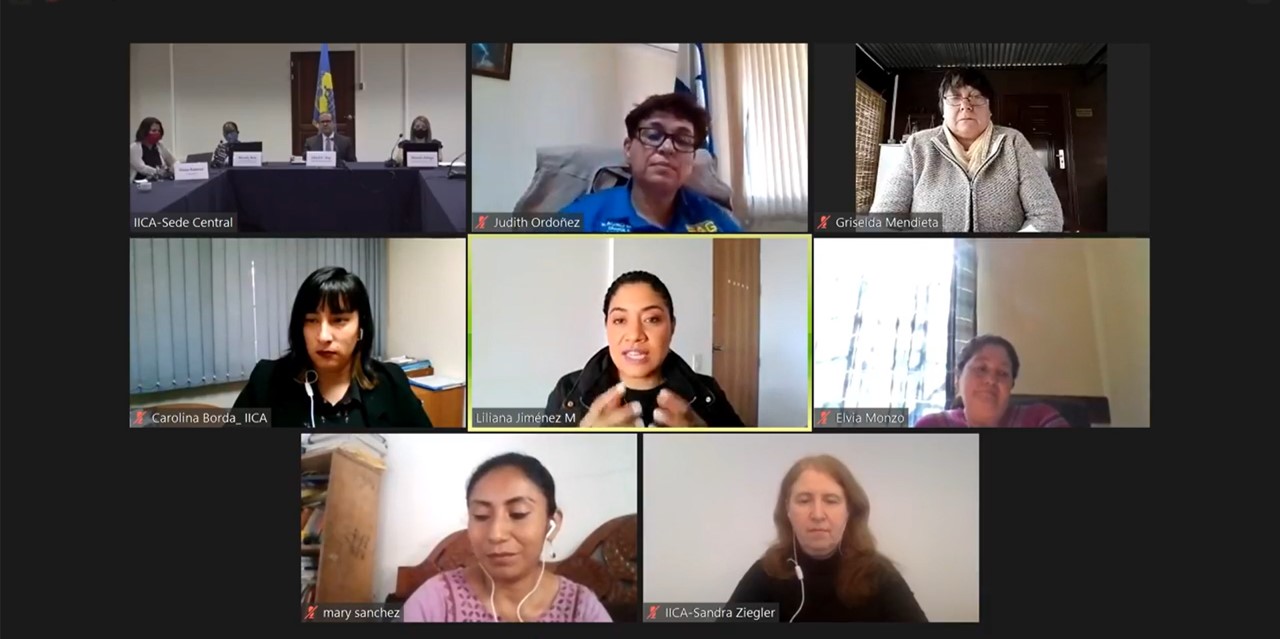On mujeresrurales.iica.int women will be able to network, share experiences, and access important information and resources intended to maximize their contribution to the agriculture sector and food security in the Americas.

San Jose, 23 August 2021 (IICA). The Inter-American Institute for Cooperation on Agriculture (IICA) has launched the Hemispheric Platform for Rural Women, a web space that will enable this segment of the population to create networks, and provide access to forums and training opportunities. It will also allow rural women to share successful experiences that have contributed to their empowerment, and showcase the key role they play in rural development and the improvement of the quality of life in their territories.
Available in Spanish, English, Portuguese and French at https://mujeresrurales.iica.int/, the platform features a wide range of exclusive, categorized content, such as indicators and statistics, audiovisual material, and information about IICA’s projects and its Member States’ policy frameworks for rural women.
The forum held to launch the platform, “Rural Women and Agrifood Systems,” not only made it possible to garner the views of rural women leaders in the Americas regarding agrifood systems, but also information about their priorities as agents of change.
Some of the priorities mentioned were the need for more opportunities to network, access to credit and differentiated financing, ownership of land and other resources, information, training and technical assistance, information and communication technologies, and innovation and research tools.
Other issues cited as crucial for the empowerment of rural women were the need for better remuneration, and for them to have a say in the development of public policies.
“Advantage must be taken of the platform being presented to us to join together, support one another, work together and share experiences, be more inclusive, and work shoulder to shoulder with our male counterparts, because we need to unite and complement, rather than compete with, one another,” observed Liliana Jiménez, a producer of organic cacao and citrus fruits in Colombia.
Farmer Tamisha Lee, President of the Jamaica Network of Rural Women Producers, stressed the importance of “ensuring that the voices of our women are heard and do not continue to be silenced.”
Elvia Monzón, a Guatemalan coffee grower and President of the Rancho Viejo Integrated Coffee Growers Cooperative, highlighted the urgent need to facilitate opportunities for training aimed at improving product quality, diversification, and access to markets that pay fair prices, all of which is urgently in need of funding.
“We contribute a great deal to the development of our communities and countries, we can generate employment for our young people and thus prevent emigration, but without money our hands are tied,” she emphasized.
María Sánchez, the representative of the “Building Hope” Network of Zoque Women in Mexico, called for efforts to “include indigenous women in land ownership,” as it is they who do most in the Southern region of the country “to conserve the biodiversity of the seeds required to continue to provide the entire range of natural foodstuffs that the family consumes.”
In a similar vein, Griselda Mendieta, a winemaker, fruit grower, and delegate of Uruguay’s Rural Development Commission, noted that it is women who “take special care of nature’s resources, thus achieving good production levels,” and reminded the participants that “every second of the day there is a rural woman somewhere in the world outdoors in the cold, in freezing temperatures, in the rain, or under the burning sun, because many of them are heads of household and have to put food on the table for their families. Therefore, we welcome whatever can be done to help and whatever can be changed.”
There are 60 million women living in the rural areas of Latin America and the Caribbean. They account for 80% of food production, but their work is underreported, with barely 10% having access to credit, and 5% to technical assistance programs.
“We hope the mujeresrurales.iica.int platform will be an effective tool for maintaining the dialogue and ensuring that rural women influence public policies. We are committed to helping women remain in the forefront of the transformation of agrifood systems,” observed the Deputy Director General of IICA, Lloyd Day.
More information:
Institutional Communication Division.
comunicacion.institucional@iica.int











